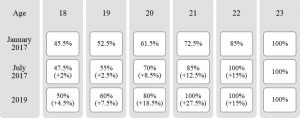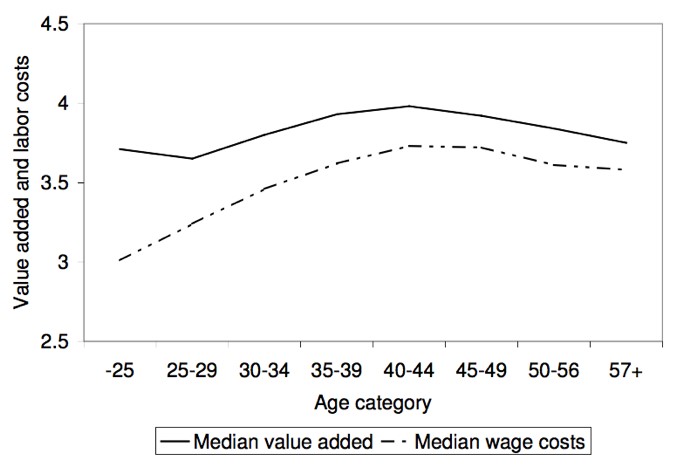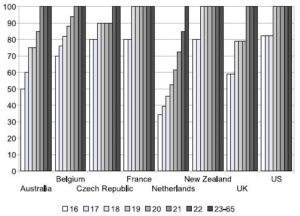For the English version, click here. “De ontwikkelingen op het vlak van duurzaamheid gaan snel. Dat wij daar een onderdeel van mogen zijn, onze
There has been an increasing call in the Dutch society for higher youth minimum wages. Currently, all minimum wage workers aged below 23 earn less than the adult minimum wage of €1551 a month, mounting to less than half of an adult minimum wage for workers that just reached their adulthood. People earning less than the adult minimum wage argue that their income is insufficient to pay for ones’ own subsistence or vital necessities, like rent expenses, health insurance and food expenditures. At last, the Dutch government responded to this cry-out by lowering the eligibility age for a full adult minimum wage to 21 and, correspondingly, increasing the minimum wages for workers below 21. After examining the aspects of the new labour market policy, I argue that, by having a closer look at worker productivity and providing an international comparison, the new policy is a step forward. However, more progress should be made.
Policy change
The current youth minimum wage differs substantially by age. Figure 1 shows that an 18-years old worker that earns a minimum wage makes only 45.5% of an adult minimum wage, which corresponds to €4.08 per hour compared to €8.96. This new minimum wage policy tries to reduce this gap. Workers aged 21 or 22 gradually face their minimum wage raise to the same level as the adult minimum wage. This transition should be fully completed by 2019. Secondly, workers in the age of 18, 19 or 20 will benefit as well from the new policy as to prevent employers from discriminating on age, which would be disadvantageous to older workers.
Figure 1: Youth minimum wage changes

Note: percentages in figure relate to the adult minimum wage of €1551 a month (based on a working week of 40 hours). Changes are in percentage points and are relative to the status quo (January 2017). Data is retrieved from budget of the Ministry of Social Affairs and Employment (September 20th, 2016).
Productivity
The idea behind providing lower minimum wages to younger workers is that their productivity is insufficient to deserve a full adult minimum wage. Put differently, if these younger workers would be entitled to an adult minimum wage, employers would be reluctant to employ them. Although there is something to be said for this theory, the current youth minimum wages have diverged too much from the adult minimum wage. The fact that productivity is a group characteristic while age is an individual characteristic makes it difficult to disentangle the effects of age on productivity. This largely explains why data and the academic literature on the relationship between age and productivity is quite limited, especially for minimum wage earners. However, some studies [1] found suggestive evidence that the productivity – wage gap is the largest for younger workers, as depicted in figure 2. This implies that younger workers, particularly the ones that are younger than 25, are strongly underpaid.
Figure 2: Productivity and wage by age

Source: Van Ours and Stoeldraijer (2010)
Furthermore, these findings are supported by the working force composition of grocery stores and restaurants. In the United States, about one third of workers in grocery stores is in the age category of 18 – 24 years. This is even more striking in fast-food restaurants where about 60% is aged younger than 25. These facts lead one to believe that the productivity – wage gap must be much more prevalent for younger workers. Thus, when looking at productivity, these workers simply deserve to earn considerably more.
“Even after the policy took full effect, minimum wages of workers aged 18 and 19 do not come close to their international counterparts.”
International comparison
When examining youth minimum wages in an international OECD perspective, it follows that younger workers in the Netherlands are especially worse off. Figure 3 shows that from this sample of OECD countries the minimum wage differences are the highest in the Netherlands. An 18-years old worker earns about 45% of an adult minimum wage while his counterpart in Belgium, France and the United Kingdom earns about 80% of the adult minimum wage. These results suggest that Dutch youth minimum wage earners are heavily underpaid and that, therefore, an increase in these youth minimum wages is justifiable and even vital.
Figure 3: Youth minimum wages in OECD countries

Source: Boeri and Van Ours (2013), The Economics of Imperfect Labour Markets.
Labour market effects
Economic theory suggests that an increase in youth minimum wages might come along with a reduction in labour demand for these groups. An increase in labour costs may induce firms to shift towards slightly older workers that did not face a wage increase. Although some studies actually found results opposing this theory [2], adverse effects will be counteracted by compensating employers for these increased labour costs. The government makes €100 million available on a yearly basis.
Conclusion
Currently, Dutch youth minimum wages differ substantially by age. This disparity seems highly unfair when one relates the productivity of youth minimum wage earners to their wages. Besides, while 18-years old workers in most OECD countries earn around 80% of an adult minimum wage, this is not even true for 21-years old workers in the Netherlands. The current policy tries to address these discrepancies, but succeeds only partially as it only provides workers aged 21 and 22 with a full adult minimum wage. Even after the policy took full effect, minimum wages of workers aged 18 and 19 do not come close to their international counterparts. Still, this youth minimum wage policy is a long-awaited start towards more equality among youth minimum wage earners. It is a good start, but more progress would be very welcome.
[1] Cardoso, Guimarães and Varejão (2010) and Van Ours and Stoeldraijer (2010)
[2] Card and Krueger (1994)
Max Pepels is a blogger at econooMax. Do you want to read more of Max? Visit the website of econooMax!





















